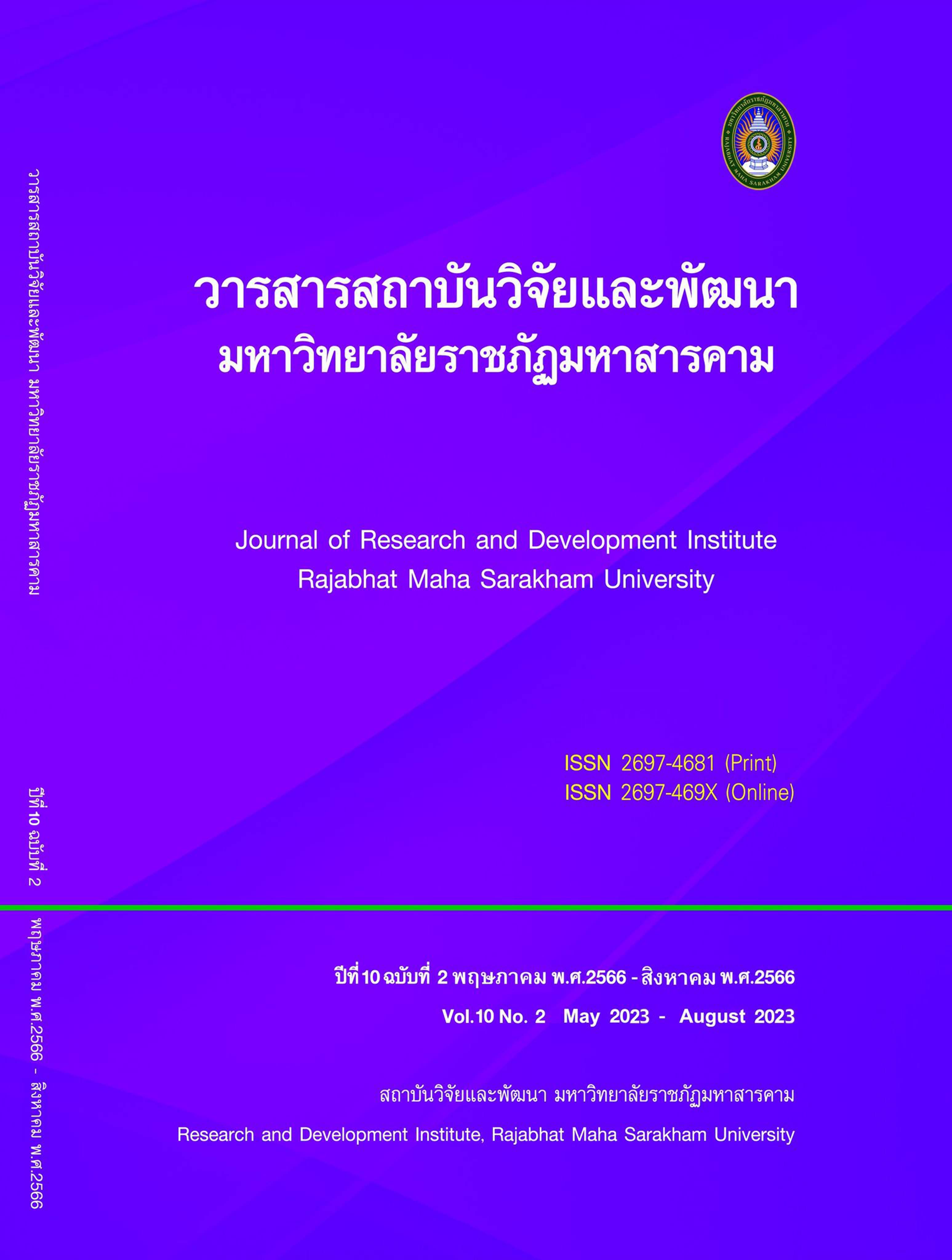THE DEVELOPMENT OF POSITIVE THINKINK AND ETHICAL PERSPECTIVE DISPLAYING SPEECH ABILITIES OF GRADE 5 STUDENTS USING EXPERIENCE-BASED LEARNING WITH TPACK MODEL
Keywords:
Experience-Based Learning (EBL), TPACK Model, Positive Thinking Ability, Ethical Perspective Displaying Speech AbilityAbstract
The objectives of this research were 1) to develop Positive Thinking Ability of grade 5 students using Experience-Based Learning (EBL) with TPACK Model. The students not less than 70% of all students would have a high level of Positive Thinking Ability. 2) To develop the Ethical Perspective Displaying Speech Ability of Grade 5 students using Experience-Based Learning (EBL) together with TPACK Model. The students not less than 70% of all students would have a moderate level of Ethical Perspectives Displaying Speech Ability. The target group consisted of 36 participants were selected from grade 5 students at Banthum (Thumprachanukroh) School, under Khon Kaen Primary Educational Service Area Office 1, during the first semester of academic year 2021. This research design was Action Research. Quantitative data were analyzed by descriptive statistics, consisting of arithmetic mean, standard deviation, and percentage. Quantitative data were analyzed by content analysis.
The results were found that:
1) The students had average scores of positive thinking ability for 4.07, accounted for 80.75% of total score and there were 36 students passed the criteria accounting for 100% which was higher than defined criteria.
2) The students had average scores of ethical perspectives displaying speech ability for 2.33, accounted for 84.10 % of total score and there were 34 students passed the criteria accounting for 100% which was higher than defined criteria.
References
Cantor, Jeffrey A. (1995). Experiential Learning in Higher Education: Linking Classroom and Community. ERIC Clearinghouse on Higher Education, Graduate School of Education and Human Development, The George Washington University.
Dechagupta, P. (2001). Student-Centered Instruction: Concepts, Methods and Teaching Techniques. Bangkok: The Master Group Management.
Han et al., (2018). Multimedia case-based learning to enhance pre-service teachers' knowledge integration for teaching with technologies. Teaching and Teacher Education, 34(1), 122–129.
Kaewpanngam, C. (2018). Guidelines for integrating digital technology for language teaching. Language Review, 33(2), 241-266.
Kaewsringam, N. (2004). Positive thinking (Positive Thinking) should think that every problem has a solution. Not every solution is a problem. Teacher Circle Journal, 1 (12), 76-78.
Kanchanakarun, J. (2009). Morality, ethics and ethical reasoning of university students. King Mongkut's University of Technology Thonburi. Bangkok: King Mongkut's University of Technology Thonburi
Kemmis, S & McTaggart, R. (1988). The Action Research Planer. (3rd ed.). Victoria: Deakin University.
Koehler, M.J., Mishra, P., & Cain, W. (2013). What is technological pedagogical content (TPACK). Journal of Education, 193(3), 13-19.
Kohlberg, L. (1976). Moral stages and moralization: The cognitive-developmental. In Moral development and behavior: Theory, research and social issues, ed. T. Lickona, New York : Holt, Rinehart and Winston.
Kolb, D.A. (1984). Experiential learning: Experience as the source of learning and development (Vol. 1). Englewood Cliffs, NJ: Prentice-Hall.
Kongkapetch, P. (2009). Classroom action research. Bangkok: Danex Inter Corporation.
Ministry of Education. (2008). Basic Education Core Curriculum 2008. Bangkok: Printing House, Agricultural Cooperative Federation of Thailand.
Seaman, J., Brown, M., & Quay, J. (2017). The evolution of experiential learning theory: Tracing lines of research in the JEE. Journal of Experiential Education, 40(4), 1-21.
Sihamampai, P. (1992). Fundamentals of religious and cultural studies. Bangkok: Chulalongkorn University Press.
Silamom, P. (2018). Effects of learning using social issues related to science as a base on science reasoning abilities of junior high school students. Bangkok : Chulalongkorn University.
Ventrella, Scott W. (2001). The power of positive thinking in business: ten traits for maximum results. New York: Free Press.
Downloads
Published
How to Cite
Issue
Section
License
Copyright (c) 2023 ฟารดา วิเชียรศรี, สิทธิพล อาจอินทร์

This work is licensed under a Creative Commons Attribution-NonCommercial-NoDerivatives 4.0 International License.
Articles that are published are copyrighted by the authors of the articles







